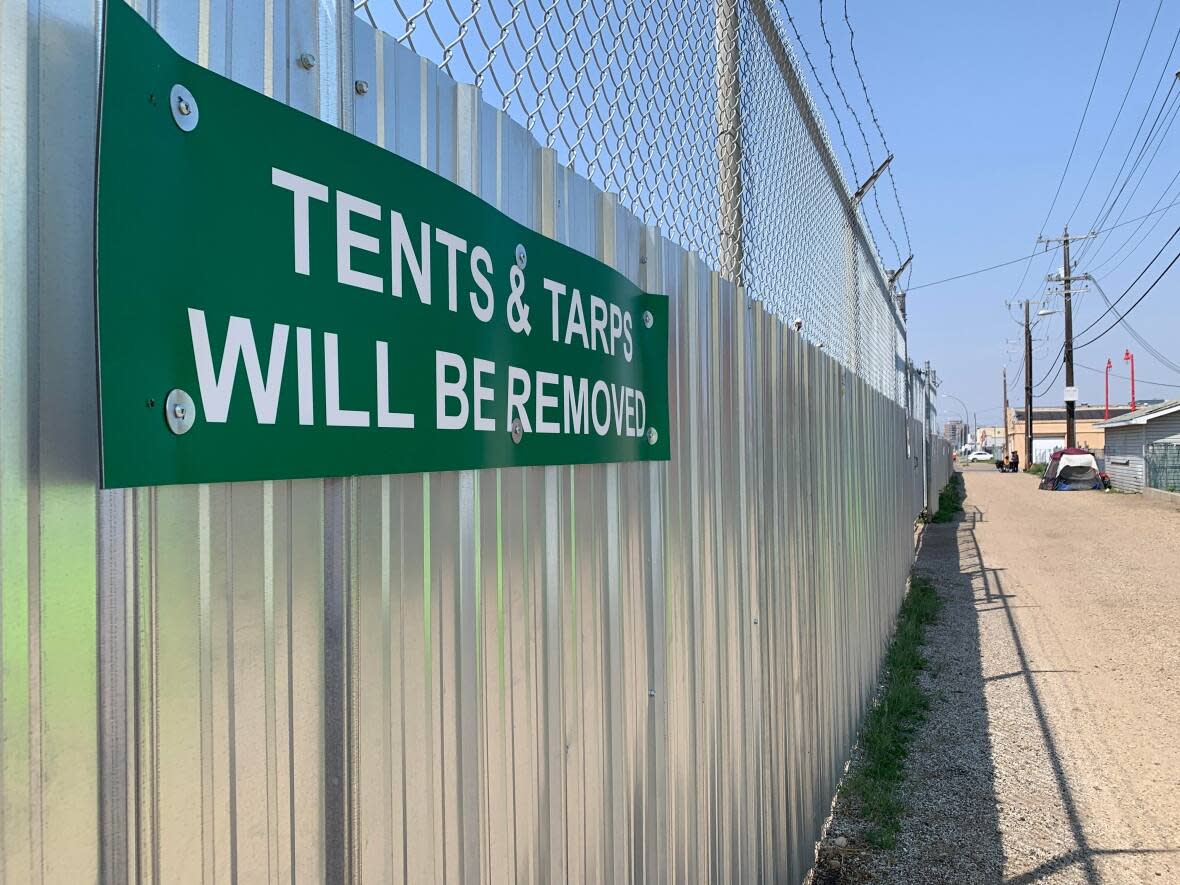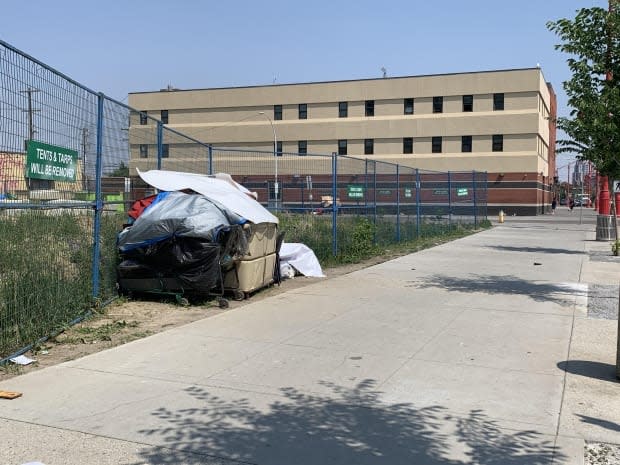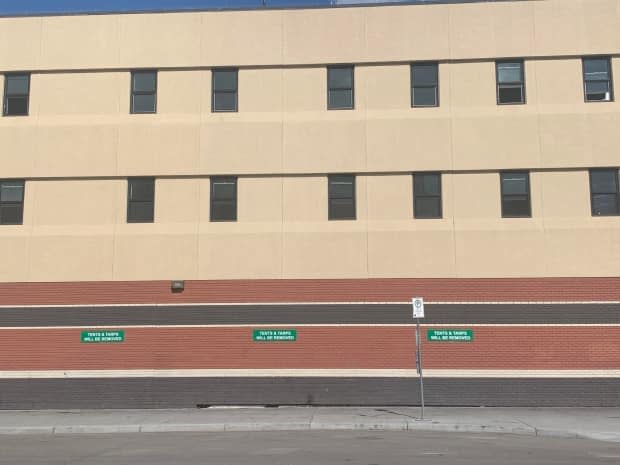Signs of tension: Tent removal warnings in Edmonton's Chinatown worry some advocates

They're official-looking, they're numerous, and they're not enforceable — for the most part.
More than 40 signs stating "Tents and tarps will be removed" have been affixed to the side of Edmonton's Hope Mission and other properties along 106th Avenue, as well as side streets and alleyways near the western edge of Chinatown.
Many hang from fencing surrounding vacant lots.
Outreach groups that work with local vulnerable people said they're disturbed by the signs, and said it's caused worry for people who are living in tents and tarps on city streets.
But the organization behind the signs says the intention is to clean up a particular stretch of sidewalk that they say has become clogged with tents and waste, and is part of an overall strategy to revitalize Edmonton's Chinatown.

"This is about safety and health," said Stephen Hammerschmidt, director of economic recovery with the Chinatown and Area Business Improvement Association (BIA).
Hammerschmidt said his organization posted the signs in May to warn people to move elsewhere because of a new program where workers will power wash that section of sidewalk.
He said prior to the signs being posted, there were 30 to 40 tents set up in the 106th Avenue area, and that many other people were hanging around, choking off access to the sidewalk.
He said it put nearby businesses in a difficult position, and that sidewalks were covered with debris and even human waste.
"It's really just giving more of a fair warning to say, look, if you do come here every two weeks, there's going to be a spray washing, that I guarantee you, for the entire summer," he said.
Hammerschmidt said police officers are on hand during the cleaning in case someone doesn't want to move, but so far, everyone has voluntarily left.
But neither Edmonton police officers nor city peace officers will move people or tents based solely on the signs, according to the Edmonton Police Service and the city. EPS spokesperson Cheryl Sheppard said officers have been attending sidewalk cleaning days at the BIA and Hope Mission's request.
"All individuals from the vulnerable community are offered supports from Hope Mission staff and EPS officers," she said.
Hammerschmidt said that the BIA is also keen to help people who are struggling, and that more than 20 people have been hired through a Hope Mission program to work on revitalization projects such as the sidewalk washing.

He said his group has no authority to enforce people moving, but said once the signs went up, there was "immediate compliance."
On Thursday, as temperatures hovered around 30 C, several people sat with their belongings directly under one of the signs across the street from Hope Mission.
A bit farther west on 106th Avenue, a camp was set up next to one of the signs, complete with a couch for a wall and a tarp for a roof.
Still, the area where signs are posted was relatively clear compared to the large encampment set up just south on 100th Street, closer to the intersection with 105th Avenue.
'Criminalization of poverty'
The sudden appearance of the signs worried social agencies that work with people who are homeless.
"It was kind of alarming," said Deb Sigaty, a volunteer with outreach group Water Warriors.
She said the group's volunteers spotted the signs shortly after they were posted, but couldn't figure out where they'd come from.
Sigaty said the reason people camp in that area is to be close to services and to the shelter if they're trying to get in and get a bed, or to be able to line up for meals.
"I just think it's very disrespectful in that way, and very hurtful that you're taking away their neighbourhood and not just explaining," she said.
She said had there been any communication about why the signs were posted, or the desire to clean up that part of the neighbourhood, people would have been understanding and supportive.

For Elliott Tanti of Boyle Street Community Services, the signs represent an attitude of caring more about the tents and tarps than the fact that people are living in them.
"I think for us it demonstrates something that we've noticed over the last year, which is a shift away from a compassionate, empathetic response to the issues that we're facing downtown towards more of an enforcement — and, frankly, a criminalization of poverty in our city," Tanti said.
A number of the BIA's signs have been affixed to Hope Mission, a non-profit that operates a shelter and offers meals and other services to vulnerable people on 106th Avenue in Chinatown.
"We don't want it to come across that we don't care about the people we serve — we do," said Tim Pasma, manager of homeless programs at Hope Mission.

He said the organization is supporting the people it serves, but also wants to be a good neighbour to Chinatown and surrounding businesses.
He added that having encampments set up against Hope Mission's building has caused safety issues in the past because of fire risk.
"We're really just trying to work collaboratively with the community and try[ing] to make this a safe and welcoming place for all people," Pasma said.
Pasma said in response to the signs, Hope Mission has been sending teams out to offer direct support and services to people who are living in encampments.


